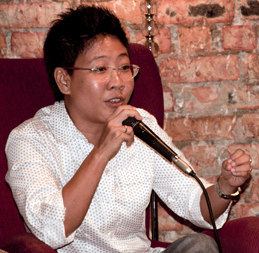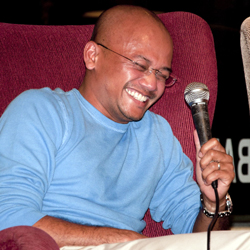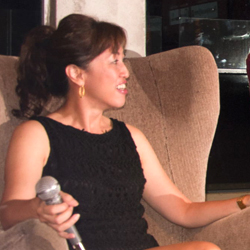
CRAZY IDEAS. Instinct. Gut feeling. It’s all part of what it takes to start a business. This was discussed during The Nut Graph’s fifth Found in Conversation event on 24 Oct 2010 on creativity and innovation in business.
AirAsia X chief executive officer Azran Osman-Rani, The Body Shop managing director Datin Mina Cheah-Foong and Red Communications founder and film and television producer Lina Tan shared their experiences when first starting up.
“We had no proof to show investors that a long-haul budget airline such as AirAsia X would be viable,” said Azran. “But we had a feeling about it. From personal experience, from going to Matta fairs and seeing uncles and aunties pushing each other to grab cheap tickets. We figured there must be huge, untapped demand in this market.”

After managing to convince Virgin’s Sir Richard Branson and other investors to put money into the venture, AirAsia X has become the first profitable low-cost budget airline, defying its critics.
“Even the Air Asia board didn’t believe in the idea at first. They wanted to stick to the [short-haul] business,” said Azran.
Profits with principles
Cheah-Foong was similarly daring when she started The Body Shop in Malaysia in the 1980s. “I thought, I cannot be the only person who loves The Body Shop idea of profits with principles and giving back to the community,” said Cheah-Foong.
She recalls how she wrote to The Body Shop founder: “I said to [Dame] Anita Roddick, ‘I have no experience and no money but I’m enthusiastic about The Body Shop and could I start it in Malaysia?’ Amazingly, she said yes!”
Cheah-Foong also had her share of critics when starting her first shop in the 1980s. “My dad thought I was crazy, giving up a good job to open a shop selling shampoo,” she said. But her gut told her it was the right thing to do and The Body Shop has expanded to over 54 stores in Malaysia.
Cheah-Foong does acknowledge that crazy ideas need to be grounded in what people want in order to take off. “There’s a fine line sometimes between lunacy and genius,” she quipped.
Gol & Gincu

Film producer Tan, when asked what “crazy” ideas she has had in her career answered quickly: “Wanting to make a movie!”
Tan, whose first movie Gol & Gincu is now a TV series, said a little naiveté helped in being innovative. “Gol & Gincu cost RM1.4 million to make, but only brought in RM600,000 at the box office,” said Tan. “We had to learn from our mistakes.”
For the next movie she produced Kami, Tan did things differently. “We got enough marketing money first. Then we made the movie for RM600,000 and earned RM1.4 million,” she said. “For our next film Pisau Cukur, we started finding funding for marketing even earlier.”
Women in business
Tan and Cheah-Foong were also asked about women leaders in business.
“It’s really about the choices women make,” said Cheah-Foong, who gave up a promising career in Hewlett-Packard to start The Body Shop. “[Other than that], there’s not really very much to stop women [from being leaders].
“Women are very good doers,” said Tan. “They’re great workers — they put everyone else first, but they are the worst at putting themselves forward. It’s hard sometimes to break out of years of socialisation where they’re taught to serve their husband, be a good mother, then only think about career. If you think about your career first, it’s almost as if you’re not a good person.”
Tan commented on how women leaders often get asked in interviews about their clothing and family life whereas their male counterparts do not receive such attention.
“I wouldn’t do such interviews where they ask me about my clothes, hair or shopping,” said Cheah-Foong. “It should be about the products and the business, not about my children or what handbag I carry. Sometimes, you need to make a stand.”
Creativity and innovation

Sometimes, it’s taking a stand that drives creativity and innovation. Just as Cheah-Foong believes it’s up to women to make choices to be leaders, likewise, Azran believes that businesses have to make deliberate decisions on embracing policies like diversity and gender inclusiveness. AirAsia X has female pilots among its crew, because “we’re huge believers in diversity”, Azran says.
“You have to create spaces. You have to deliberately enforce it,” he adds.
Another big breakthrough for AirAsia X was realising that most airlines kept their planes dormant for half the day. This was because these airlines catered to premium customers who wanted to fly and arrive at convenient times. “For AirAsia X, we sometimes arrive very early in the morning or leave late at night so our planes can be used optimally,” Azran said.
The panelists also demonstrated they have not been afraid to tackle issues deemed sensitive or taboo by others in their business.

Cheah-Foong said The Body Shop collaborated with PT Foundation 20 years ago to provide employment opportunities for transgender people. The Body Shop also sells safe sex packs providing condoms, information on how to use a condom, HIV/AIDS and on how to negotiate safe sex with partners. “At one time, these packs were our top-selling item,” said Cheah-Foong. “Research showed people really needed information on how to use condoms.”
Tan recalled an episode of 3R (Respect, Relax and Respond), a TV programme on women’s issues, which she produces. “There is no reason why women should not be able to talk about their periods on air,” Tan said. “So we had an episode with tasks like in Amazing Race. We got guys to purchase sanitary napkins with exact specifications such as slim wings or Nightsafe. They were asking questions like, ‘Do they come in sizes?’ That programme went on to win an award.”
And as for AirAsia X, it has taken on the issue of flying rights to Sydney, which they have not been able to obtain so far from the Malaysian government. Their plane to Australia now carry the words “Liberate Sydney, break the monopoly”.
On a national scale
Can such creativity and innovation, exemplified in the businesses of the panelists, be implemented in the running of the country?
Creativity requires change, Cheah-Foong notes when asked how Malaysia could become a more creative and innovative nation.
“As a nation, we are not [more creative and innovative]. In fact, many want the good old days. Most people want to follow, not lead. As a nation, it may be difficult to move.”
Azran thinks it’s more about accepting and leveraging on Malaysia’s existing strength — its diversity.
Until the day change is no longer feared and diversity is genuinely accepted, it’s up to a few — like the panelists — to keep pushing the boundaries. ![]()

Found in Conversation is a series of conversations hosted by The Nut Graph with our media partner PopRadeeo and venue sponsor Leonardo’s Dining Room and Wine Loft. It aims to link personalities, ideas and people, and to provide opportunities for the public to engage with notable personalities and industry experts.
The final forum, to be held on 14 Nov 2010, will be on creativity and innovation in design. Follow us on Twitter and Facebook, or sign up for our e-newsletter.


Narayan says
I want to start a pressure group in Sydney , writing to airports and to authorities and start a on line campaign..what type of support Air Asia X is willing to provide. I live in Sydney and do fly regularly to Asian destination…the number of passengers from here would be phenomenal.